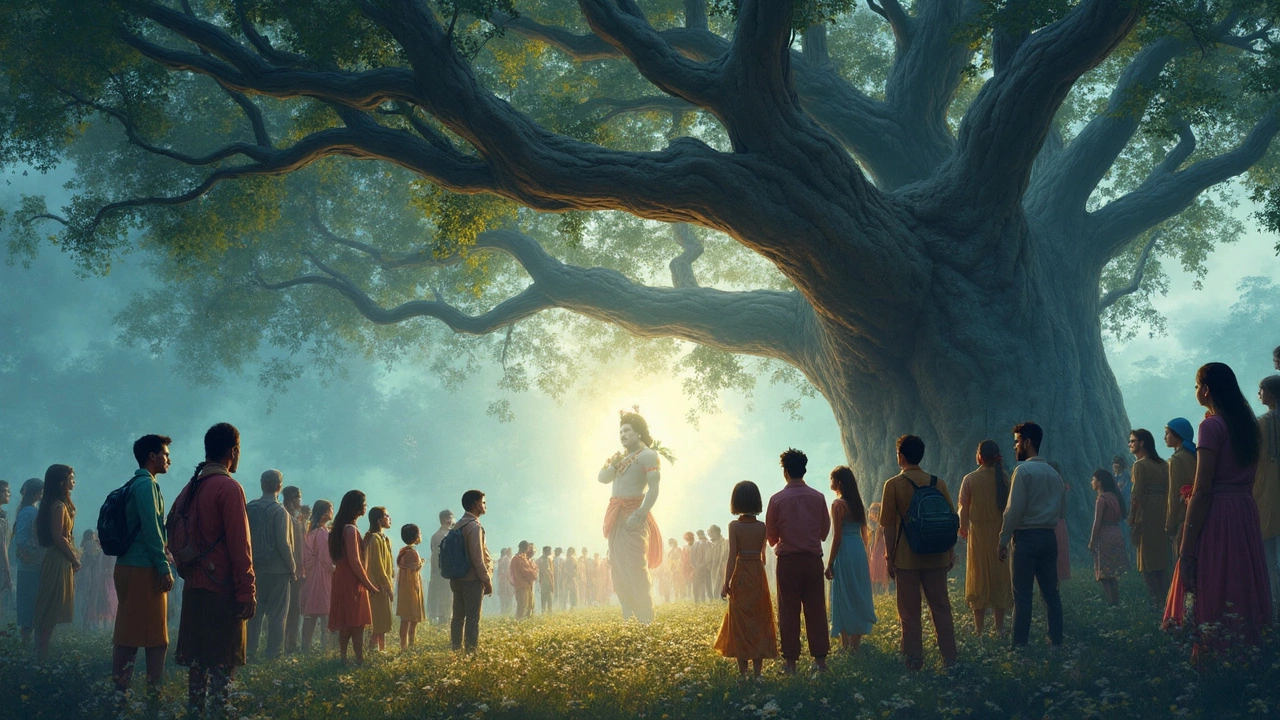If there's one book that has profoundly shaped spiritual thought in India, it's the Bhagavad Gita. Ever wondered why it continues to captivate people across generations? Well, it all boils down to one thing: its timeless wisdom. Nestled within this sacred text is a line that stands out, speaking directly to your soul.
The famous verse goes like this: 'Karmanye vadhikaraste ma phaleshu kadachana'. In simple terms, this means you have the right to perform your actions, but not to the fruits of those actions. It's a game-changer, isn't it?
This line is basically telling you that worrying about the results is a distraction. Focus on your actions, and everything else will follow. It changes how you approach challenges, doesn’t it? It's about doing your duty and letting go of the anxiety about what comes next. Sounds liberating, right?
- Understanding the Context
- The Famous Line
- Why It Resonates
- Modern Interpretations
- Applying the Wisdom Today
Understanding the Context
To really get why the Gita is such a big deal, you have to understand when and how it came about. Picture this: a vast battlefield before the great Kurukshetra War. Two massive armies poised for a showdown—there's tension, anxiety, and the clamor of war drums in the air. In the middle of all this, Arjuna, one of the mightiest warriors, finds himself having an existential crisis. He's unsure, shaken, and caught in a dilemma of right and wrong. Heavy, right?
This is when Lord Krishna, who is Arjuna’s charioteer and confidant, steps in. What's interesting is that Krishna doesn't just offer a pep talk or quick advice. Instead, he unveils an entire philosophy, which we now know as the Bhagavad Gita. It's like attending the ultimate life coaching session, right there on the battlefield!
Now, let's zoom in on this specific conversation. It takes place in the form of dialogue in the Bhishma Parva section of the epic Mahabharata. The Gita contains 18 chapters filled with teachings about life, duty, and spirituality. And this is where the famous line, "Karmanye vadhikaraste ma phaleshu kadachana," makes its mark. It's not just a message to Arjuna; it’s a message to all of us.
Historical Importance
The time when the Gita was composed is essential to understanding its teachings. While there's no exact date, it is believed to be compiled somewhere between the 5th and 2nd century BCE, weaving through the spiritual fabric of India. That's pretty ancient, but its messages about action, detachment, and duty are spot-on even today.
The message is not just philosophical but also highly practical. Think about your daily life: dealing with stress, balancing work and personal life, making tough decisions. Those questions Arjuna faced? They're not that different from ours. Krishna’s advice provides a mindset that helps in cutting through the fog of doubts.
The Famous Line
Alright, let's get into the meat of it. The Gita's most famous line, "Karmanye vadhikaraste ma phaleshu kadachana," advises focusing on actions, not the results. This idea is revolutionary and offers a fresh perspective on life.
So what's the deal with this line? This verse is from the Bhagavad Gita, a conversation between Lord Krishna and Arjuna right before the great war at Kurukshetra. Arjuna is confused and morally troubled. To lift him out of his bewilderment, Krishna drops this gem of wisdom. He suggests that Arjuna should commit to his duty as a warrior without obsessing over the eventual outcome of the battle. It's about dedication to your task, which sounds simple but holds immense power.
Why does it matter so much? In today's fast-paced life, stress and anxiety over outcomes often bog us down. This line from the Gita nudges you to break free from these shackles. Imagine tackling a project at work where you're constantly worried about the end result. Instead, focusing solely on the task at hand allows you to work better and feel less pressure. The verse isn't saying outcomes don't matter, but that obsessing over them cripples effective action.
Practical Wisdom
This idea isn't just spiritual mumbo jumbo; it has practical applications in areas like education, business, and personal growth. For instance, students often fret over grades, sometimes more than learning itself. But if they shift their focus on enjoying the learning process, they might actually perform better. The same goes for entrepreneurs who worry about profits rather than the quality of their product or service.
In essence, the message is about mindfulness and being present. If you give your best effort, the results will take care of themselves. So the next time you're caught in a storm of worry about outcomes, remember this line from the Gita to guide you forward.

Why It Resonates
The Bhagavad Gita line 'Karmanye vadhikaraste ma phaleshu kadachana' strikes a chord with many because it addresses a universal struggle: how to deal with the unpredictability of life. It’s like getting a lifehack from ancient wisdom! Let's break down why it keeps popping up in conversations about purpose and fulfillment.
The Shift from Outcome to Process
We're conditioned to chase results, whether it's in our careers or personal lives. This line flips the script. It's all about focusing on the process, which can relieve stress and boost satisfaction. When you pay more attention to doing your best in each moment, it often leads to better outcomes anyway. The pressure of chasing outcomes is lifted, making room for creativity and genuine effort.
Embracing Uncertainty
Life's unpredictability can be unsettling, right? The Gita teaches you to accept that the results aren't entirely in your hands. By internalizing this, you open yourself to whatever life throws at you, without fear or anxiety about the future. It's a mindset that leads to inner peace and resilience.
Universal Applicability
This teaching isn't confined to spiritual seekers or philosophers. It's practical for everyone, whether you're an entrepreneur, a student, or a parent. The idea encourages focusing energy on what you can control while gracefully handling what you can't. It's relatable because everyone, at some point, grapples with the challenge of uncontrollable outcomes.
- Business leaders use it to emphasize the importance of process over just bottom-line profits.
- In education, it encourages students to focus on learning rather than just grades.
- In personal growth, it aids individuals in focusing on personal effort over external validation.
Ultimately, the famous line from the Gita remains a timeless piece of advice, teaching everyone how to navigate life's uncertainties with a calm and focused mind.
Modern Interpretations
So, how does this famous line of the Gita translate into today's fast-paced world? Let’s explore! The core idea of focusing on action and not the reward reshapes our approach to work and personal goals. In modern terms, it's a call to hustle without getting caught up in the 'what ifs.' It's about being in the moment.
Applying the Principle in the Workplace
In a professional setting, this means giving your best effort without getting obsessed with that promotion or salary hike. It’s about mastering your skills and contributing value. Imagine focusing all your energy on improving your craft, rather than stressing over what might happen if you don't get that coveted position. There’s a certain freedom in it, isn’t there?
Personal Growth and Mindfulness
On a personal level, this Gita verse encourages mindfulness. Instead of being anxious about the endless possibilities of the future, it shifts your attention to the now. It's like when you're learning a new hobby or hitting the gym. You're not supposed to fret about becoming an expert or super fit instantly; you just show up and give your best.
Moreover, the teachings of the Bhagavad Gita and this famous line show up in therapy and mindfulness practices today. It aligns with the concept of letting go, a common theme in various personal development strategies.
Adapting to Challenges
Especially in a world full of uncertainties and competition, this message from the Gita resonates. Its strength lies in its flexibility to adapt to different circumstances while urging you to keep going, regardless of the outcome.
Here’s an interesting fact: A survey showed that individuals who internalize this principle tend to experience reduced stress levels and higher satisfaction in their endeavors. When you focus on the process rather than the result, you're less likely to burn out or feel overwhelmed.
Bottom line? Whether you're a student, a professional, or anyone on a journey of self-improvement, the Gita's message encourages you to invest in your efforts wholeheartedly, freeing yourself from the burdens of expectation.

Applying the Wisdom Today
So, how do you take that age-old wisdom from the Gita and put it to use in today's world? The phrase 'focus on actions, not results' seems pretty straightforward. But when life's chaos hits, sticking to it can feel like a tall order. Here's how you can make it work.
Finding Purpose in Daily Life
The lesson of doing your duty without fretting about outcomes is a game-changer at work. Whether you’re leading projects or managing a team, the stress about results can be paralyzing. If you shift your focus to just doing your best, putting in that honest effort each day, you might find you’re less anxious and more productive.
Navigating Personal Relationships
This gem from the Bhagavad Gita can even guide personal relationships. Trying to win affection or appreciation can make you feel trapped. Instead, give your time and energy because you genuinely care. You’ll notice that when you drop expectations, relationships often turn more rewarding.
Managing Stress and Anxiety
The hustle and bustle of modern life often brings stress. Reminding yourself to focus on actions rather than outcomes helps alleviate some of this. Next time you're overwhelmed, try concentrating on what you can control: your choices and actions. It’s freeing when you realize that outcomes are often influenced by countless external factors.
Boosting Creative Ventures
For creators, whether you're writing, painting, or coding, this advice can be transformative. Creativity often stalls when we become fixated on people's reactions or sales numbers. Reconnecting with the joy of creation itself can reignite your passion and lead to better, more authentic work.
Here’s a small illustration of how focusing on actions over results can influence productivity:
| Task | Focus on Actions | Focus on Results |
|---|---|---|
| Writing a Book | Commit to writing 500 words daily | Worry about getting it published |
| Fitness Routine | Exercise for 30 minutes daily | Stress over weight loss goals |
Using such a mindset may not change the world overnight. But it can surely change your experience of it, one day at a time. Give it a shot, you might just end up surprising yourself!
